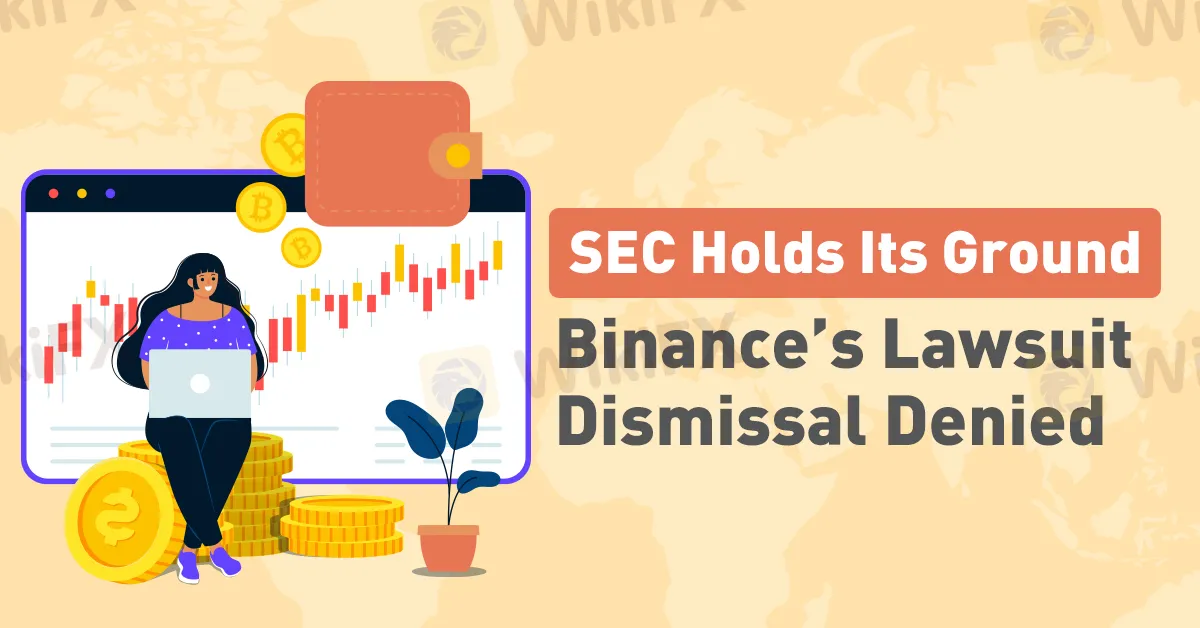简体中文
繁體中文
English
Pусский
日本語
ภาษาไทย
Tiếng Việt
Bahasa Indonesia
Español
हिन्दी
Filippiiniläinen
Français
Deutsch
Português
Türkçe
한국어
العربية
SEC Holds Its Ground, Binance’s Lawsuit Dismissal Denied
Abstract:The U.S. Securities and Exchange Commission (SEC) takes on Binance's bid to dismiss a lawsuit, citing legal deficiencies and raising questions about unregistered securities in this unfolding financial drama.

The U.S. Securities and Exchange Commission (SEC) has issued a robust response to Binance's endeavour to dismiss the lawsuit it faces, contending that such a move lacks a solid legal foundation. The SEC's legal battle with Binance, initiated in June, revolves around allegations that the platform had offered unregistered securities to the public.
In a filing submitted on a recent Wednesday, the SEC firmly rebuffed Binance and Binance.US's attempts to have the lawsuit, previously filed during the summer, summarily dismissed. The regulatory authority firmly asserted that Binance's motion relies on interpretations of federal law and legal precedents that are, in its view, “distorted” and “tortured.”
The SEC's original lawsuit, filed in June, not only accused both Binance and Coinbase of offering unregistered securities to the public but also presented additional allegations against Binance.
In its recent submission, the SEC argued that Binance's arguments, if accepted, would effectively undermine the foundational precedents upon which the nation's securities laws have been built over decades. Such acceptance would establish a new and unfounded “rigid framework” that contradicts well-established legal precedents and existing legislation.

Among the SEC's contentions, it asserted that Binance's sale of the BNB token via an initial coin offering as a fundraising mechanism violated securities laws, as did the sale of Binance USD (BUSD) as an investment contract. The regulatory agency also contended that Binance's staking and earn programs were in violation of federal securities laws.
Furthermore, the SEC rejected an argument put forth by Binance concerning the “Major Questions Doctrine,” a principle that stipulates clear congressional authorization for specific agency actions. In recent times, this doctrine has become a crucial defense for crypto companies, as they argue that the SEC's actions require more explicit backing from legislators.
In a separate development earlier this month, Binance's U.S. affiliate sought a court order to protect itself from what it deemed an improper “fishing expedition” by the SEC. The protective order requested by Binance aims to place limits on the number of employees that the SEC can question, excluding key figures like CEO Changpeng “CZ” Zhao. Binance contends that its senior executives lack unique firsthand knowledge about the circumstances surrounding the security, custody, and transfer of customer assets.
The order would also confine the scope of questioning to matters directly pertinent to the consent order and prohibit requests for communications on subjects beyond customer assets.
Back in June, the U.S. branch of Binance, operating under BAM Trading Services and BAM Management US Holdings, consented to an agreement with the SEC following the agency's bid to freeze all of its assets. However, according to Binance's recent filing, the SEC's demands for discovery extend far beyond the previously agreed-upon terms, with Binance asserting that these demands are not relevant to the ongoing investigation.

Disclaimer:
The views in this article only represent the author's personal views, and do not constitute investment advice on this platform. This platform does not guarantee the accuracy, completeness and timeliness of the information in the article, and will not be liable for any loss caused by the use of or reliance on the information in the article.
Read more

Bybit Shuts Down NFT Marketplace Amid Crypto Market Downturn
Bybit announces the closure of its NFT marketplace, citing efforts to streamline offerings. Discover the latest trends in the declining NFT market and its shift to utility-based growth.

Galaxy Digital Settles $200M in Luna Token Manipulation Case
Galaxy Digital pays $200M to settle Luna token manipulation probe by NY regulators, linked to TerraUSD’s 2022 crash, impacting crypto market stability.

Vanuatu Passes VASP Act to Regulate Crypto and Digital Assets
Vanuatu's new VASP Act regulates crypto businesses, enforcing strict licensing, AML/CFT compliance, and investor protections.

Blockchain Decentralization: Empowering a Trustless Future
In recent years, blockchain technology has rapidly evolved from a niche innovation behind Bitcoin into a transformative force across industries. At its core, blockchain decentralization refers to the distribution of authority and decision-making away from a central entity and into the hands of a distributed network of participants. This shift redefines how data is stored and verified and paves the way for trustless, transparent, and resilient systems that challenge traditional centralized models.
WikiFX Broker
Latest News
Exposing the Top 5 Scam Brokers of March 2025: A Closer Look by WikiFX
Gold Prices Climb Again – Have Investors Seized the Opportunity?
Webull Launches SMSF Investment Platform with Zero Fees
Australian Regulator Warns of Money Laundering and Fraud Risks in Crypto ATMs
The Withdrawal Trap: How Scam Brokers Lure Victims into Paying More
FCA to Investors: Think Twice Before Trusting These Brokers
Trump\s tariffs: How could they affect the UK and your money
Trump gambles it all on global tariffs he\s wanted for decades
TradingView Brings Live Market Charts to Telegram Users with New Mini App
HTFX Spreads Joy During Eid Charity Event in Jakarta
Currency Calculator







